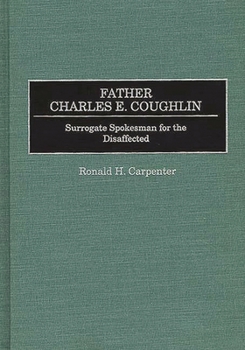Father Charles E. Coughlin: Surrogate Spokesman for the Disaffected
As Americans moved from farms and small towns to large cities, they tended to lose a hallmark of their earlier life: comparatively direct participation in the discourse of pragmatic affairs. The ubiquitous radio, which became a primary medium of communication during the Great Depression, tended to make Americans listeners more than speakers about important issues. Nevertheless, as the economic catastrophe of the time evoked desires in people to express...
Format:Hardcover
Language:English
ISBN:0313290407
ISBN13:9780313290404
Release Date:April 1998
Publisher:Greenwood
Length:224 Pages
Weight:1.14 lbs.
Dimensions:0.8" x 6.4" x 9.6"
Customer Reviews
0 rating





